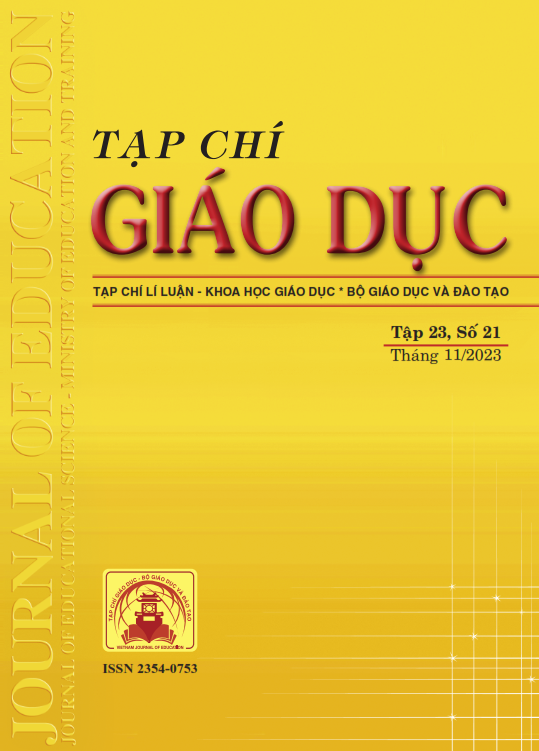Rèn kĩ năng thiết kế thí nghiệm theo định hướng phát triển năng lực dạy học STEM cho sinh viên ngành Giáo dục tiểu học
Tóm tắt
When teachers conduct a STEM lesson with the participation of components, it’s crucial to organize students to explore basic scientific knowledge and explain problematic situations related to scientific knowledge in the lesson in many different ways, including experimental methods. Therefore, it is necessary to train students' experimenting skills in order to improve their performance of STEM lessons as well as their STEM teaching capacity. The article presents the concept of STEM teaching competence, analyzes the relationship between experimental teaching and STEM teaching through identifying the important position of the experiment in the STEM teaching process with illustrative examples of how to integrate experiments into STEM lessons. On that basis, the paper proposes an experiment designing process oriented to develop STEM teaching capacity and a 4-step training process on experiment designing skills to facilitate STEM lessons. It also provides criteria for assessing experiment designing skills and guidance on how to assess these skills.
Tài liệu tham khảo
Anderson, C. A., & Dill, K. E. (2000). Video games and aggressive thoughts, feelings, and behavior in the laboratory and in life. Journal of Personality and Social Psychology, 78(4), 772-790.
Akerson, V. L., Cullen, T. A., & Hanson, D. L. (2011). The Influence of Guided-Inquiry and Explicit Instruction on K-6 Teachers' Views of Nature of Science. Journal of Science Teacher Education, 22(3), 291-318.
Đặng Thị Thuận An, Trần Trung Ninh (2015). Phát triển năng lực dạy học tích hợp cho sinh viên Sư phạm Hóa học. Tạp chí Giáo dục, số đặc biệt tháng 12, 126-128.
Đinh Quang Báo, Nguyễn Đức Thành (2000). Lí luận dạy học sinh học (Phần Đại cương). NXB Giáo dục.
Đỗ Thị Loan (2017). Kĩ năng thiết kế thí nghiệm cần hình thành cho sinh viên sư phạm sinh học trong quá trình dạy học sinh lí thực vật. Tạp chí Giáo dục, 412, 41-45.
Doe, J. (2019). The Complex Nature of Experiments in Scientific Inquiry. Scientific Methods Review, 27(4), 256-273. https://doi.org/10.5678/smr.2019.27.4.256
Hattie, J., Yates, G., & Rickards, F. (2017). Learning intentions and success criteria in mathematics. In Visible Learning: Feedback (pp. 54-68). Routledge.
Hofstein, A., & Lunetta, V. N. (2004). The laboratory in science education: Foundations for the twenty-first century. Science Education, 88(1), 28-54.
Hofstein, A., & Mamlok-Naaman, R. (2007). The laboratory in science education: The state of the art. Chemistry Education Research and Practice, 8(2), 105-107.
Johnson, R. M., Clark, A. C., & Lee, S. (2018). Hands-On Activities Increase Student Engagement and Success in the Science Classroom. Journal of Science Education and Technology, 27(6), 521-529.
Linn, M. C., & Eylon, B. S. (2011). Science learning and instruction: Taking advantage of technology to promote knowledge integration. Routledge.
Linn, M. C., Lee, H. S., Tinker, R., Husic, F., & Chiu, J. (2016). Teaching and assessing knowledge integration in science. Science, 333(6046), 971-972.
Nguyen, H., Yang, M., & Sinitski, E. (2017). Observational Studies of Science Classroom Learning: A Review. Research in Science Education, 47(5), 1111-1138.
Nguyen, H. T., & Smith, J. K. (2019). A Comparative Analysis of Experimental and Traditional Methods for Teaching Electromagnetic Principles. International Journal of STEM Education, 6(1), 1-11.
Smith, A. B., Johnson, C. D., & Williams, E. F. (2020). The Impact of Hands-On Experiments on Understanding Cellular Structure. Journal of Science Education and Technology, 29(2), 271-285.
Smith, J. (2020). The Role of Experiments in Scientific Research. Journal of Science, 45(2), 112-129. https://doi.org/10.1234/js.2020.45.2.112
Windschitl, M., Thompson, J., & Braaten, M. (2008). Beyond the scientific method: Model-based inquiry as a new paradigm of preference for school science investigations. Science Education, 92(5), 941-967.
Windschitl, M., Thompson, J. & Braaten, M. (2012). Ambitious pedagogy as a necessary condition for ambitious science instruction. Science Education, 96(5), 927-941.
Tải xuống
Đã Xuất bản
Cách trích dẫn
Số
Chuyên mục
Giấy phép

Tác phẩm này được cấp phép theo Ghi nhận tác giả của Creative Commons Giấy phép quốc tế 4.0 .












